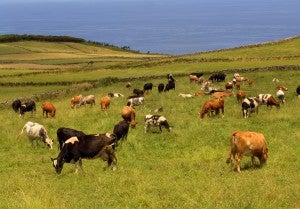Rangeland ecosystems cover approximately one third of the land area in the United States and half the land area of California. What if that vast domain could be utilized to combat climate change, and ranchers could get paid for land management practices that keep more carbon in the soil and enhance production?
That’s the direction we’re going, thanks to a new carbon accounting standard approved today by the American Carbon Registry. The new protocol allows ranchers who reduce their greenhouse gas footprint by applying compost to their fields to earn credits that can be traded on the voluntary carbon market.
Climate benefits
The standard is supported by research conducted by the Silver Lab at the University of California, Berkeley, which shows that applying a half inch of compost to rangeland soils removes greenhouse gases from the atmosphere at the rate of half a ton per acre each year.










